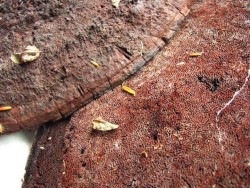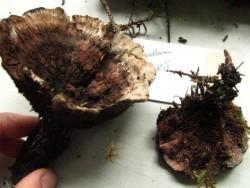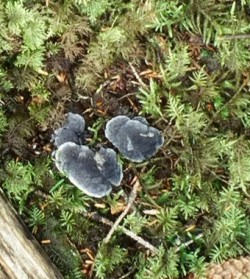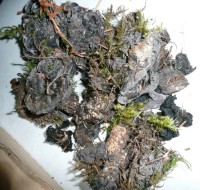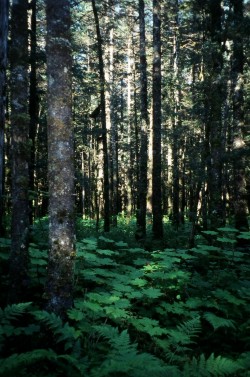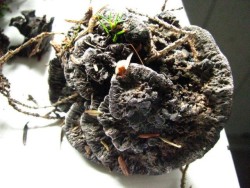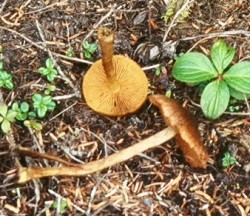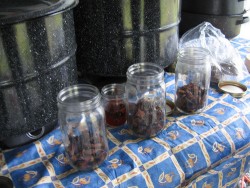Mushrooms for Color |
 |
CORDOVAFUNGUSFESTIVALMUSHROOM DYE WORKSHOP |
 |
|---|
The 2nd Annual "Cordova Fungus Festival", to which I was delighted to be invited to teach a 6 hour workshop about Mushroom Dyes, was organized by a group of amateur mycologists from all walks of life in Cordova, Alaska. They do not have any “formal” mushroom club, just an intense interest and focus on fungi. The US Forest Service offices generously provided space to display mushrooms, and hold workshops (with microscopes to use).
All of Cordova seemed to be involved in this affair – every other business had a poster in the window, fishermen, store owners and forest service folk were wearing Cordova Fungus Festival T-shirts… everywhere the enthusiasm was palpable and contagious. Dr. Steve Trudell from University of Washington, became the “lead mycologist”, but we also had local field biologists on hand – courtesy of the Forest Service, several members of whom are also avid dyers and knitters, including Erin Cooper a field biologist with the USFS, and a key organizer of the Festival and of the Mushroom Dye Workshop, along with Dottie Widmann, the owner of the most incredible fiber-arts supply store I have ever been in – “The Net Loft”.
Every morning, small groups of us would gather at "The Net Loft" to set out on dye mushroom forays. All collecting permits had been secured in advance from Eyak Corporation and the U.S. Forest Service. We found Dermocybes with orange and yellow gills, light blue Phellodon atrata, fragrant soft blue Hydnellum suaveolans , fresh Hydnellum peckii oozing red droplets, deep in the mossy woods amongst the blueberry and Devil Club bushes .
Within several days, we had a good collection of potential dye fungi, along with a change of weather that included cold horizontal rain right off of Prince William Sound! But we were undercover next to the Catholic Church for the most part, and certainly had no shortage of fresh pH5 rain water for our dyepots! I had brought with me samples of several types of wool and silk, premordanted with alum (1 knot) and iron (5 knots - see the dyed knotted dyed yarns samples below). These were all tied into individual swatches , and labelled in a manner so that everyone would go home with a sample from each dyepot.
Here are some of our results and the Cordovan mushrooms we used. We also experimented with some local lichens, photos of which will hopefully arrive soon. What an incredible esperience for me to return to my native born Alaska to teach about and spred the word of Miriam C. Rice and her mushroom dyes! - Dorothy Beebee, Forestville, CA
DYE MUSHROOMS |
DESCRIPTIONS |
DYES on WOOL & SILK |
Phaeolus schweinitzii (?) (Photos byMeadow Scott)
|
Phaeolus schweinitzii : Collected on 8-29-08 at Dotty Widmann's home, last year's growth with velvety, thin, uniformly chocolate brown polypore "shelves" found 5 to 6 feet high on a Sitka Spruce tree. (I had never seen Phaeolus growing this high on a tree before, only at the base of conifer trees. I am wondering if it is perhaps an Ischnoderma of some sort? But it did make the same range of dyes with alum and iron premordanted wool that the Phaeolus sp. growing in California would. - D. Beebee)
|
valign="top"
|
Hydnellum peckii (Photo by Susanna Marquette)
(Photo by Meadow Scott) |
Hydnellum peckii was found in many places especially under Sitka Spruce trees, nestled in deep moss. The young form was pinkish white with red drops of juice oozing from the surface. It dried to a concave dark brown shape with pinkish edges, and dark brown protuberances in the center.We added washing soda to the dyebath to increse the alkalinity to pH9, hoping to intensify the dye color.(Top group of samples to right). And then we took out a small batch of mushroom dyebath, with a yarn sample, putting both into a separate pot to heat, and changed the pH of the dyebath to 'acidic' by adding white vinegar, thereby changing the pH to 4 - which totally washed out the dye color! (See lower samples to the right.) |
|
Phellodon atrata (Top photo by Dorothy Beebee, Lower photo by Susanna Marquette) |
Phellodon atrata teeth fungi were found in a similar habitat as Hydnellum peckii, especially under Sitka Spruce trees, nestled deep in the mossy woods amongst the blueberry and Devil Club bushes.
(Photo by Dorothy Beebee) |
(Photo by Meadow Scott) |
Orange-gilled Dermocybes Photos by Amy O'Neill Houck
Orange and Yellow-gilled Dermocybes (Photo by Dorothy Beebee) |
We found mushrooms in the Cortinarius group of "Dermocybes", (a sub-group of Cortinarius fungi with brightly colored gills), growing often inCordova area in open forests of Sitka Spruce and blueberry bushes. Two (or more) kinds were collected locally: basically those with orange gills and some with yellow gills, often growing right next to each other in the deep moss, and often difficult to tell apart after they had set their rusty spores. I suspect that there were several different species within each group. Some were seen along roadsides and banks, seeming to prefer more light and access to moisture in the late Cordovan summer, while others were hidden deep in the duff of the Sitka Spruce rainforest.
Habitat photo by Amy O'Neill Houck, |
Dyes from orange-gilled Dermocybes |
Yellow - gilled Dermocybe (Photos by Dorothy Beebee) |
Yellow-gilled Dermocybe mushrooms were split into 2 dyebaths: 1) one of caps only 2) another of stalks only of the fresh yellow-gilled Dermocybes. These groups were each put into wide-mouth canning jars to simmer in the large canning pot of jars along with other Dermocybe mushrooms for about 45 minutes.
|
Dyes from only the caps of yellow-gilled Dermocybes
Dyes from only the stalks of yellow-gilled Dermocybes |
Preparing the mushrooms for dye (Photo by Susanna Marquette) |
|
Sorting and drying the mushrooms dyed yarn and silk samples (Photo by Amy O'Neill Houck) |
|
I offer my sincerest thanks to Erin Cooper (above) for organizing and inviting me to teach at the Cordova Mushroom Dye Workshop, and to Allen and Susanna Marquette for being my most generous hosts at their home in Cordova! - Dorothy Beebee |

